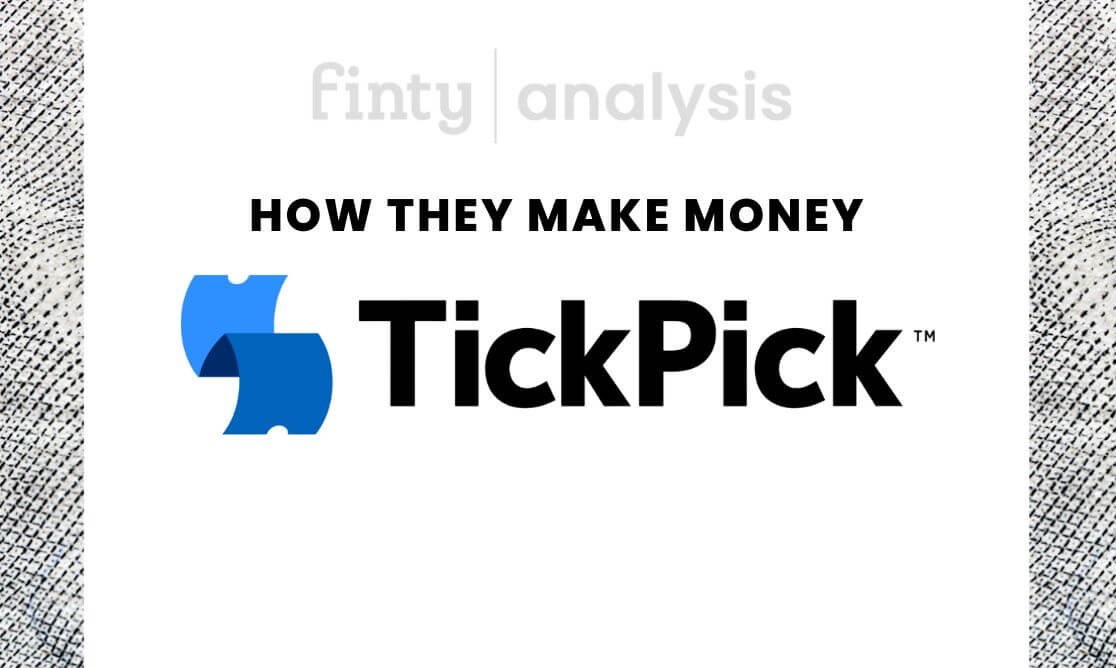TickPick, the innovative ticket resale platform, has captured the attention of event-goers and investors with its unique ticketing approach.
Its transparent and fan-friendly platform has disrupted the traditional ticket resale market, taking market share from incumbents. But how does TickPick generate revenue and maintain its position in this competitive industry?
Read on for more details on the intricacies of TickPick's business model and how they really make money — there's more going on than meets the eye.

Coming up next
What does TickPick do?
TickPick is an innovative online ticket marketplace that allows users to buy and sell event tickets at competitive prices.
Founded by Brett Goldberg and Chris O'Brien in 2011, the platform's core offering is to eliminate excessive service fees, creating a more transparent, user-friendly customer experience.
The company has distinguished itself by introducing a unique bidding system, which enables buyers to offer the amount they are willing to pay for a ticket, and sellers to accept or decline the offer.
How does TickPick work?
At a high level, TickPick operates as an online platform where members can purchase tickets to various events, including concerts, sports, and theater productions.
The platform hosts a vast network of sellers, from individual users to licensed professional brokerages. Using TickPick's proprietary bidding system, buyers can specify their desired price for an event, and sellers can accept or decline the buyer's offer.
This interactive process ensures that both parties have control over the transaction and can make decisions based on market demand and their respective preferences. To ensure transparency, the platform displays a "deal score" for each ticket, giving buyers a simple metric to gauge the deal's value.
How TickPick makes money
TickPick generates revenue through a variety of methods, including charging sellers a flat fee percent commission on each ticket sold, and by collecting additional fees on ticket purchases. The primary sources of income for the company are as follows:
Fragmentation and aggregation
One of the key ways TickPick generates revenue is through the process of fragmentation and aggregation. TickPick capitalizes on the inefficiencies within the ticketing market by aggregating tickets from various sources, including individual sellers, brokers, and other ticket marketplaces.
By consolidating these disparate ticket listings, TickPick creates a comprehensive inventory that caters to the diverse preferences of event-goers.
No buyer fees, seller fees instead
Unlike many traditional ticketing platforms that charge buyers additional fees, TickPick has adopted a seller-focused approach.
Instead of burdening buyers with extra charges, TickPick imposes a transparent and fixed fee structure on sellers.
This strategy enhances price transparency and encourages sellers to list their tickets on TickPick, ensuring a robust inventory for buyers to choose from.
Dynamic pricing
Leveraging real-time market data, TickPick employs sophisticated algorithms to determine ticket prices. These algorithms consider a slew of factors, such as supply and demand, seat location, event popularity, and historical pricing trends.
By dynamically adjusting prices, TickPick aims to strike a balance between maximizing revenue and offering competitive pricing options to buyers.
Premium services and partnerships
In addition to its core ticket resale business, TickPick offers premium services to enhance the event experience.
These services include VIP packages, access to exclusive pre-sales, and other perks catering to avid fans.
TickPick also establishes strategic partnerships with sports teams, musicians, and event organizers, unlocking opportunities for exclusive ticket allocations, promotional collaborations, and other mutually beneficial ventures.
Secondary market data insights
TickPick capitalizes on the vast amounts of data it collects through its platform to gain valuable insights into the ticketing industry.
Their dataset includes information on pricing trends, customer preferences, market demand, and event popularity. By analyzing and leveraging this data, TickPick can refine its pricing algorithms and offer data-driven insights to industry stakeholders, empowering them to make informed decisions.
Future growth engine
Based on the company's success and growth potential, there are several opportunities for TickPick to strengthen its position in the market and expand its business.
TickPick can expand into new markets and capitalize on existing and new partnerships with high-profile event organizers, artists, and teams.
Its offering is US-centric, leaving the rest of the world's addressable market an option for growth. English-speaking markets such as the UK, Canada, and Australia would be easier options for expansion.
Competitors
TickPick's competitors employ different strategies to attract and retain customers, creating a diverse and competitive landscape within the online event ticketing industry.
Despite this competition, TickPick continues to grow and attract users through its unique features and commitment to creating a transparent ticket-purchasing experience.
TickPick's main competitors include:
- StubHub. A well-known platform that also focuses on eliminating service fees, providing competition in the user-friendly ticketing space.
- SeatGeek. Offers a similar platform with a deal score feature, targeting price-conscious buyers.
- VividSeats. Provides a competing ticket resale platform with a rewards program for frequent buyers.
- Ticketmaster. A major direct ticket seller that also offers resale options on its platform.

